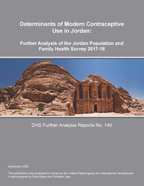There is no printed copy available to order.
Abstract:
Use of modern contraceptive methods has decreased in Jordan over the past 8 years. Since understanding of modern contraceptive use allows family planning programs to improve messaging and better meet the needs of women, we use data from 12,126 currently married, non-pregnant women interviewed in the 2017-18 Jordan Population and Family Health Survey to identify correlates of contraceptive use. We use multinomial logistic regression models to contrast patterns in modern contraception use with traditional contraception use.
Equal proportions of women in the sample were using no method or a modern method (42%), while 16% were using a traditional method. Contraceptive use differed by all covariates except for experience of domestic violence.
Sociodemographic covariates of age, education, husband’s education, governorate, and number of living children were significantly associated with modern contraceptive use, even after controlling for other covariates. Women have a lower risk of using modern methods when they want another child in the next 2 years compared to not wanting any more children, and if their husband wants more children than they do, compared to wanting the same number of children. Discussions with a health-care worker about family planning and being involved in family planning decisions increase a woman’s risk of using a modern method. Two additional models included a variable on domestic violence experience, which had no effect on risk of modern method use, and under-5 child health visits, which were associated with an increased likelihood of modern method use. While most covariates had similar patterns of association for modern and traditional method use, some, including husband’s education and exposure to FP media messages, were associated with higher risk of modern method use, but not with traditional method use.
This study supports efforts to integrate family planning into other areas of health service delivery, and combine service delivery improvements with efforts that shift gender and empowerment norms and promote women’s empowerment and gender equity.
